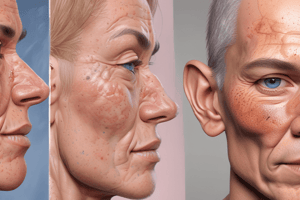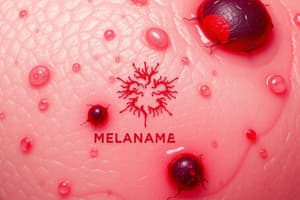Podcast
Questions and Answers
Describe the lesion in relation to the normal skin.
Describe the lesion in relation to the normal skin.
The lesion should be compared in terms of color, texture, size, and any associated changes to the surrounding skin and nails.
What factors are used to classify epithelia?
What factors are used to classify epithelia?
The number of cell layers and the shape of the superficial cells.
What are the three embryonic germ layers that give rise to epithelia?
What are the three embryonic germ layers that give rise to epithelia?
Ectoderm, mesoderm, and endoderm.
All cells composing a simple epithelium contact the basal lamina.
All cells composing a simple epithelium contact the basal lamina.
Signup and view all the answers
Epithelia are vascular and receive nourishment from blood vessels.
Epithelia are vascular and receive nourishment from blood vessels.
Signup and view all the answers
What is the role of the basement membrane in epithelial tissues?
What is the role of the basement membrane in epithelial tissues?
Signup and view all the answers
What type of epithelium gives the appearance of multiple cell layers but is actually a single layer?
What type of epithelium gives the appearance of multiple cell layers but is actually a single layer?
Signup and view all the answers
How do epithelia receive nourishment?
How do epithelia receive nourishment?
Signup and view all the answers
Which of the following describes a characteristic of epithelial cells?
Which of the following describes a characteristic of epithelial cells?
Signup and view all the answers
Study Notes
Clinical Case Overview
- A 59-year-old female presented with a non-painful lesion on the pinky finger of her right hand, identified 2-3 months prior.
- The lesion distorted her fingernail, indicating potential underlying issues.
Epithelia and Glands: General Information
- Epithelia arise from all three embryonic germ layers: ectoderm, mesoderm, and endoderm.
- They protect internal and external surfaces of the body, except for tooth surfaces and articular cartilages.
- Epithelia form both endocrine and exocrine secretory glands.
Epithelia Structure
- Composed of sheets of closely packed cells with minimal extracellular space.
- Cells exhibit polarity with distinct apical, lateral, and basal domains, essential for their functionality.
- A basement membrane, comprising a basal lamina and lamina reticularis, separates epithelium from connective tissues and blood vessels.
Epithelia Characteristics
- Epithelial tissues are avascular and obtain nutrients through diffusion from the underlying basal lamina.
- Capable of regeneration and renewal, crucial for maintaining integrity after injury or stress.
Epithelial Classification
- Classified based on the number of cell layers and shapes of superficial cells.
- All cells in a simple epithelium contact the basal lamina, whereas in stratified epithelia, only the deepest layer does.
- Pseudostratified epithelia appear multilayered but are made up of a single layer with all cells touching the basal lamina.
Specific Types of Epithelia
- Pseudostratified Ciliated Columnar Epithelium: A unique variant that appears stratified but is a single layer, often involved in secretion and movement of materials via cilia.
Further Investigation
- Additional analysis of the lesion in comparison to normal skin may highlight abnormalities in tissue organization and potential pathology.
Studying That Suits You
Use AI to generate personalized quizzes and flashcards to suit your learning preferences.
Related Documents
Description
Explore this clinical case of a 59-year-old female with a lesion on her pinky finger. Study the implications of skin lesions, their clinical significance, and the relationship between epithelia and glands. Test your understanding of dermatological concepts through this peer group learning exercise.




